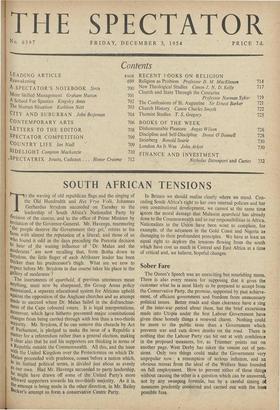SOUTH AFRICAN TENSIONS
o the waving of old republican flags and the singing of the Old Hundredth and Het Vrye Volk, Johannes Gerhardus Strydom succeeded on Tuesday to the leadership of South Africa's Nationalist Party by decision of the caucus, and to the office of Prime Minister by invitation of the Governor-General. Mr. Havenga, murmuring the people deserve the Government they get,' retires to his farm with almost the reputation of a liberal; and those of us Who found it odd in the days preceding the Pretoria decision to hear of the waning influence of Dr. Malan and the moderates' are now recalling that, from Botha down to Strydom, the little finger of each Afrikaner leader has been thicker than his predecessor's thigh. What are we now to expect before Mr. Strydom in due course takes his place in the gallery of moderates ?
The instruments of apartheid, if previous utterances mean anything, must now be sharpened, the Group Areas policy Maintained, a separate educational system for Africans upheld against the opposition of the Anglican churches and an attempt made to succeed where Dr. Malan failed in the disfranchise- tnent of the Cape coloured voters. It is legal interpretations, Moreover, which have hitherto prevented major constitutional Changes from being carried through with less than a two-thirds majority. Mr. Strydom, if he can remove this obstacle by Act Of Parliament, is pledged to make the issue of a Republic a matter for a referendum rather than a general election, making it clear also that he and his supporters are thinking in terms of a Republic outside the Commonwealth. All this, and the issue With the United Kingdom over the Protectorates on which Dr. Malan proceeded with prudence, comes before a nation which, in its limited political terms, is divided just about as evenly as our own. Had Mr. Havenga succeeded to party leadership. he might have drawn off some of the United Party's more leftward supporters towards his two-thirds majority. As it is, the-attempt is being made in the other direction, in Mr. Bailey liecker's attempt to form a conservative Centre Party. In Britain we should realise clearly where we stand. Con- ceding South Africa's right to her own internal policies and her own constitutional development, we cannot at the same time ignore the moral damage that Malanist apartheid has already done to the Commonwealth and to our responsibilities in Africa. Nationalists in the Union have been wont to complain, for example, of the advances in the Gold Coast and Nigeria as damaging to their profoundest principles. We have at least an equal right to deplore the tensions flowing from the south which have cost us much in Central and East Africa at a time of critical and, we believe, hopeful changes.










































 Previous page
Previous page